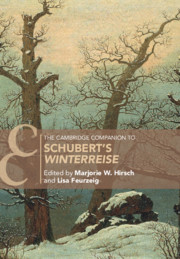Book contents
- The Cambridge Companion to Schubert’s Winterreise
- Cambridge Companions to Music
- The Cambridge Companion to Schubert’s Winterreise
- Copyright page
- Dedication
- Contents
- Figures
- Tables
- Music Examples
- Contributors
- Acknowledgments
- Note on Pitch
- Chronology
- Abbreviations
- Introduction: An Endless Winter Journey
- Part I Schubert’s Winterreise and Its Musical Heritage
- Part II Die Winterreise: Poetic Cycle
- 4 Wilhelm Müller’s Odyssey
- 5 Schubert’s Treatment of Müller’s Poems: Some Issues
- Part III Cultural and Historical Contexts
- Part IV Winterreise: Song Cycle
- Part V Winterreise After 1827
- Appendix
- Guide to Further Reading
- Index
4 - Wilhelm Müller’s Odyssey
from Part II - Die Winterreise: Poetic Cycle
Published online by Cambridge University Press: 02 February 2021
- The Cambridge Companion to Schubert’s Winterreise
- Cambridge Companions to Music
- The Cambridge Companion to Schubert’s Winterreise
- Copyright page
- Dedication
- Contents
- Figures
- Tables
- Music Examples
- Contributors
- Acknowledgments
- Note on Pitch
- Chronology
- Abbreviations
- Introduction: An Endless Winter Journey
- Part I Schubert’s Winterreise and Its Musical Heritage
- Part II Die Winterreise: Poetic Cycle
- 4 Wilhelm Müller’s Odyssey
- 5 Schubert’s Treatment of Müller’s Poems: Some Issues
- Part III Cultural and Historical Contexts
- Part IV Winterreise: Song Cycle
- Part V Winterreise After 1827
- Appendix
- Guide to Further Reading
- Index
Summary
Born to a master tailor and his wife in the provincial town of Dessau, Johann Ludwig Wilhelm Müller (1794–1827) was the sole one of their seven children to survive infancy. The family occasionally received small financial assistance from Leopold Franz III, the Prince of Anhalt-Dessau, elevated in 1807 to its Duke. The Anglophile peace-loving regent created one of the most progressive and prosperous of the smaller German states. He cultivated educational and social reforms, supported architectural and landscape design and scientific inquiry, and encouraged religious tolerance in a state that was home to congregants of several Christian denominations and a growing Jewish community. The first German-language Jewish newspaper was founded in Dessau in 1806. Müller attended the local Gymnasium, excelling in the study of languages. Following a period of university studies, military service, and scholarly Wanderjahre, he eventually settled down as a teacher in the city of his birth.
- Type
- Chapter
- Information
- The Cambridge Companion to Schubert's ‘Winterreise' , pp. 61 - 74Publisher: Cambridge University PressPrint publication year: 2021

